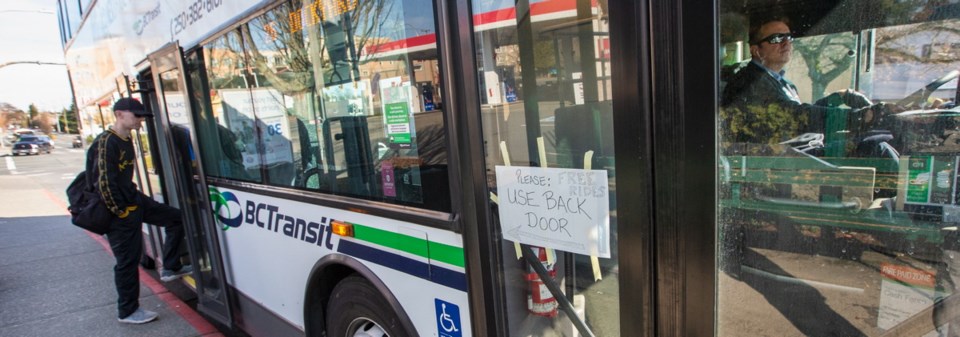B.C. Transit has stopped collecting fares and is loading passengers through rear doors as it works to reduce the risk of COVID-19 transmission.
The measures will be in place for 30 days.
“We continue to work hard to implement plans and processes as necessary,” said B.C. Transit spokesman Jonathon Dyck.
He said that having customers board via rear doors will “enhance social-distancing for drivers and passengers.”
Passengers who need to use the bus ramp or have the bus lowered so they can board will still be able to load through the front door, he said.
People are being encouraged to move to open spaces on the bus, and to check the NextRide website to see how full a particular bus is, Dyck said.
Not collecting fares on either the conventional or handyDART systems reduces interactions for drivers and is another way to create social-distancing, he said.
B.C. Transit is doing what it can to have the right number of buses on the road, Dyck said.
Ridership in Greater Victoria has gone down by as much as 50% because of the COVID-19 pandemic, in part because classes are no longer being held on the University of Victoria and Camosun College campuses.
“We’re working to match ridership with demand and expect to have daily trip cancellations for the foreseeable future,” Dyck said. “We will update customers on a day-by-day basis through our website and our customer call centre.”
Similar measures are being put in place on transit systems across the country.
The free fares are not an issue, given the “uncharted circumstance” of what is happening, Dyck said. “Everybody’s dealing with this right now, not just us,” he said.
“It’s organizations and businesses and agencies.”
“We realize that people rely on us to get to where they need to go,” he said.
“That includes work. We have staff and health-care workers that need to get to the hospital or care facilities.
“We have people that need to go out for groceries or to pharmacies.”
B.C. Transit previously announced that it had stepped up cleaning on buses to deal with COVID-19.
“We do our daily cleans and then the full-detail clean, as necessary, but we’ve also instituted regular disinfecting of high-touch areas,” Dyck said. “And we do have plans if we need to increase our cleaning processes.”
More cleaning is being done at B.C. Transit facilities, as well.



